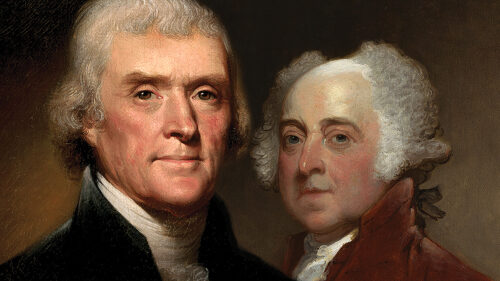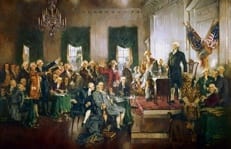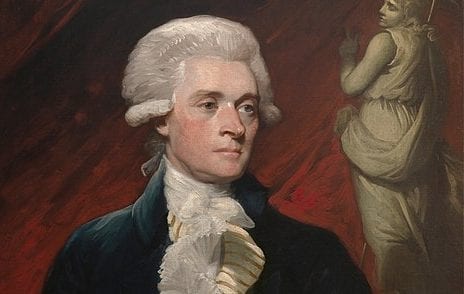
From Bullets to Ballots: The Election of 1800 - Prologue
What are the lessons of the 1790s?
It is heartening when a country first recognizes the equal right of every citizen to participate in free elections. For this step is—or at least should be—a reflection of the equality of every human being, and recognition of human equality is the foundation of civilized politics. As the experience of many new democracies in recent decades has shown, however, the adoption of free elections does not by itself guarantee the civilized conduct of politics and the peaceful resolution of political conflicts. New democracies have to find their way towards attitudes, practices and institutional arrangements that complement free elections with a culture and a constitution of freedom.
This was demonstrated by the very first modern new democracy, the United States of America. The Americans’ first experiences as an independent democratic republic in the 1780s and 1790s were turbulent and occasionally violent. However, in 1801 this first modern democratic regime added to its already impressive set of political achievements the first-ever peaceful transition of power after democratic elections had been won by a party in opposition to the government of the day. Never before in human history had such a thing taken place. Hitherto, legally sanctioned persecution and punishment of the losers in such political revolutions were the invariable rule. Even in the immediately preceding American experience, the conflict between Patriots and Loyalists during the war for independence from Britain in the 1770s and 1780s, the resolution of the conflict between these deeply-divided political forces had been violent and intolerant.

What can citizens and democracy builders in other countries today learn from the American experience of two centuries ago? Americans’ experience with their new democracy in the 1790s illustrates several lessons for today’s new democrats. These are lessons about the kinds of partisan divisions that serve democratic politics, and about the ways in which democratic institutions can be made compatible with such partisan divisions. America’s first party system demonstrates that decent democratic politics requires good political parties as well as other good political institutions.
The lessons of the 1790s can be concisely summarized under four rubrics: partisan principles, public respectability, partisan vices, and individual statecraft.
Partisan principles
Good political parties have principles. But not all political principles make good partisan principles. In the first place, good democratic citizens will agree on the fundamental principles of democracy itself—the principles of majority rule and minority rights—so these are not proper objects of democratic partisan conflict, although partisan rhetoric will often make it appear that they are in dispute even though they are not. In the second place, certain other kinds of political principle are equally inappropriate as partisan issues in democracies. Theological beliefs are the prime example of these. It is not that democratic citizens must agree on these (they probably will not), but that any disagreements they have on them are not justly settled by political debate and voting. In fact, thus distinguishing religion from politics is one of those fundamental principles of modern democracy on which democratic citizens must agree if they are to avoid violent partisan conflict.
Principles that are properly disputed in partisan contests in democratic countries are differing views about the appropriate policies or actions that a particular democracy should pursue in the given circumstances. American political history shows that deep partisan divisions on such matters need not constantly arise: there have been long periods during which the major parties have not advocated significantly different sets of policies. But this history also shows that when such deep divisions do arise they can be settled in a civilized manner by peaceful transfers of power when the party in government loses an election. Politics during elections deciding such principled disputes are likely to be much less calm and orderly than politics at other times, but the peaceful American electoral “Revolution of 1800” showed that it is better for a democracy to make space for principled electoral battles than it is to pretend that there will always be complete agreement on important policy questions. Repressing such honest disagreements of principle simply tends to make them surface in uglier and less manageable forms in the end.
Public respectability
By engaging in principled conflicts, parties help ensure that significant policy innovations receive reliable signs of public approval in the shape of decisive electoral victories. In this manner policies are tested and strengthened. Political parties thus make democratic government more complete and more sure-footed. In order to do this, they need and deserve a degree of public respectability. It is not easy for statesmen to prescribe or to produce the right degree of public respectability for political parties. Democratic citizens are often tempted to take a cynical view of party conflict, even when the conflicting parties rightly claim that they are fighting about matters of principle. Often this natural cynicism is encouraged by political leaders, either because—perhaps wisely, perhaps unwisely—they judge that it is imprudent for partisan conflict to be encouraged at the time; or because—unwisely—they believe that partisan conflict should always be discouraged. This unwise blanket rejection of partisanship can be inspired by the fact that political parties—even properly principled ones—have vices as well as virtues, and citizens naturally recoil from these vices.
Partisan vices
Successful parties rest on solid economic interests as well as on policy principles. While it is foolishly cynical to adopt the Marxist view that parties’ “ideologies” are merely rationalizations of the economic interests that they favor, it would be naïve to expect parties to thrive without their connections to various interest groups. This feature of political parties is not in itself a vice. Like individuals, political parties naturally have material interests as well as opinions. But this natural fact repels many citizens from party politics, or at least makes their support for party politics less wholehearted than it should be.
What is more truly vicious about political parties, and what makes statesmen and citizens rightly distrust their effects on politics, is their apparently innate tendency to use some of the most destructive weapons of rhetoric—lies, character assassinations, scandal-mongering—and to promote exaggerated adversarial positions, personality cults and clashes, ideological distortions of political facts, and fears of imagined conspiracies. All of these dubious partisan methods were part of the American experience of the 1790s, and reinforced some statesmen’s judgments (for example, that of George Washington) that the introduction of party conflict was unnecessary and undesirable. However, one of the most important lessons that arose out of this experience is that it is precisely by granting political partisanship a significant amount of public respectability that the healthy air of publicity can moderate some of the vices of partisanship as well as the vices of irresponsible governments. Former President Konare of Mali, when asked recently about the problem of corruption in that very new and fragile democracy, pointed out that corruption was not something new: “Democracy is simply making it more visible. Because of the freedom of speech, people are free to say things even if they are incorrect and without evidence.” Openly organizing a party and publicizing its purposes tends to make it less of a private conspiracy, to bind it to its professed public spirited principles, and to make it responsible for its actions. Moreover, the distorting tendencies of partisan ideologies are sometimes checked by reason and reflection, as shown by the progress of Thomas Jefferson’s Republican party in learning from experiences that went against its ideological predilection for revolutionary France. The low ways of partisan politics do not prevent the establishment of a useful public respectability for political partisanship, even if they do ensure that democratic citizens will generally continue to have at least a healthy skepticism about their parties.
Individual Statecraft
One of the most striking parallels between the American experience of the 1790s and that of later emerging democracies is the importance of the chief executive office, and of the person occupying that office. George Washington (president from 1789 to 1797) was the hero of American patriots, and it was almost impossible for partisan opposition to be mounted against the policies of his administration. John Adams (president from 1797 to 1801) also tried to be superior to party politics. However, Thomas Jefferson took office as President in 1801 as the acknowledged leader of a political party. For political partisanship to gain a sufficient degree of public respectability, chief executive officers must either become party leaders themselves, or eventually they must be replaced by someone like Jefferson, willing to combine responsible constitutional executive power with responsive party leadership. An interim period in which party conflict remains somewhat muted and a country has a supra-partisan leader is not unnatural. However, eventually party politics can help solve the important problem of how to transfer executive power from one person to another without a loss—possibly even with a gain—in legitimacy. The inevitable rivalries inspired by the availability of a single, non-hereditary chief executive office (whether a president or a prime minister) can be well structured by open partisan competition.
This means that one of the useful functions of a modern party system is to make government leadership by less-than-heroic politicians more acceptable and legitimate. Politicians publicly identified with a party can be more responsible because of the constraint imposed on them by that identification. As the experience of America and other mature democracies in the last quarter of the twentieth century showed, the return of more candidate-centered elections, and the corresponding decline of the power of political parties to contain the ambitions of individual candidates, is a retrograde step. However, modern party government does not make individual statecraft less necessary. Good political parties are parties that not only have the right kinds of principles but also have resourceful leaders, able to employ the sometimes hypocritical tactics and manipulative techniques of partisan warfare without debasing themselves, their party, or their country; and equally able to lead their parties away from deep policy and ideological battles when they are neither necessary nor desirable. The advent of party government does not replace the need for wise statesmanship. But it does mean that wise statesmen will work within the context of party politics, in spite of its vices, because they will recognize that healthy party competition enhances democratic politics.
These are the main lessons supported by the narrative and analysis of this monograph. Readers will be in a position to draw several further important conclusions as well. These further conclusions concern the psychology of effective partisan strategies, and ways of introducing a good form of party politics into an emerging democracy. They also concern certain problems that are likely to be encountered in this process, such as preoccupations with national solidarity, and entanglements of domestic conflicts with attachments to foreign powers.

One set of these further conclusions is the importance to party politics of patience, perseverance, and persuasion. The eight-year effort by Jefferson’s Republican party to turn what they always believed was support for them by a majority of the electorate into a decisive electoral victory demonstrates that perseverance and patience are valuable qualities in democratic partisans and that these qualities can pay large electoral dividends. This is true not only of challengers but also of those ousted from power in electoral revolutions, who must—and can—content themselves with the fact that they have the right to retreat, to regroup, and to try to become triumphant challengers in their turn. The Federalist party, ousted from power by the Republicans in the elections of 1800, were in this respect in the same position as Jefferson’s Republican party would have been in during the 1790s, if instead of having a majority in the electorate that they had only to mobilize, they (like later majority parties in American history) had had to build such a majority, turning themselves from a minority into a majority by their powers of persuasion and by exploiting the course of events. After all, one of the main assumptions of the case for having the possibility of reasonably principled party conflict in a democracy is that advocacy and persuasion are essential parts of political life. As Aristotle pointed out, human beings are political animals because they talk about what is good and bad. If persuasion is central to political life, then, especially in a democracy, provision for public partisan conflict is preferable to the government’s assumption that it deserves and enjoys widespread popular support or deference.
Electoral revolutions brought about by peaceful transfers of power after deeply divided partisan conflict serve as a replacement for but also as a supplement to violent political change. Threatening a party in power with rejection by a majority of voters at the next election is a reminder that humans possess a natural right of revolution, which can be used to threaten a party in power with force. Ballots supplement bullets as a way of controlling government. They are far preferable to bullets, but they work partly because they concentrate the minds of governments by reminding them that giving in to electoral pressure is a way of avoiding having to give in to forceful revolutionary pressure. The natural right of revolution is based on the natural purposes of government—the safety and happiness of the people—and when governments stray from those purposes it is well for party campaigns to recall them to their minds. Partisan campaigns that recall the natural ends of government can also improve the quality of deliberation by voters, by encouraging them to judge the government fairly and reasonably. By judging governments and by improving the deliberation of voters, political parties can be the best preventatives of violent revolutions, even though they cannot in every case rule out the possibility and the possible justice of such revolutions. Partisan elections can be, as Jefferson said in his First Inaugural Address, “a mild and safe corrective of abuses which are lopped by the sword of the revolution where peaceable remedies are unprovided.”)
